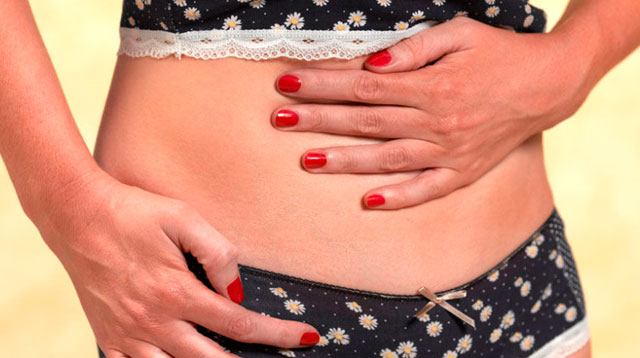Don't act like you've never heard of period poop. If you're a person who has periods, you're almost certainly a person who has period poop—or that confusing and horrific onslaught of bowel activity that coincides with the beginning of your period each month.
Because most women have probably found themselves in the unenviable position of Googling WHY AM I POOPING SO MUCH?!?! from the toilet, here's everything you need to know about the phenomenon of period poop, which, by the way, is very normal.
Why the flood gates open
A brief biology lesson makes this a lot easier to understand. Your period is just one part of the whole monthly menstrual cycle—and the cycle is made up of rises and drops in certain hormones and bodily chemicals. One of those chemicals is called prostaglandins. As Rebecca Brightman, an ob-gyn in New York City, explained, your uterus starts releasing prostaglandin at the onset of your period because it causes smooth muscle (which lines your uterus) to contract. Those contractions are what push your uterus to start "sloughing off" its lining, or in other words, they kick off your period and are why you get cramps. So they're necessary but also incredibly rude.
But do you know what other, nearby organ system is also lined with smooth muscle? Your gastrointestinal (GI) tract. "Sometimes our body releases so much prostaglandin that it doesn't just target the uterus, it targets other areas of the body, and in this case, the GI tract," said Mira Kaga, an internal medicine physician in New Jersey. So it stands to reason that if you have particularly brutal cramps, you will also have particularly brutal poops.
Dr. Kaga said that for some women, the prostaglandin attack on the GI tract results in diarrhea, and for others, it’s just a general increase in bowel movements. The good news here is that, since prostaglandin aids in starting your period, this particular symptom typically tapers off after a few days. The days you're the crampiest (for most women, days one and two) are the days you’re also the poopiest. So next time your period starts and you feel like your entire pelvic region is exploding from every orifice, feel free to shout, "DAMN THESE PROSTAGLANDINS," while you're hunched over on the toilet. They're what's to blame.
Under pressure
Ha, you're a woman, right? Did you honestly think that was it? No! Of course that's not it. There's more to this hellstorm.
Another hormone that makes the whole menstrual cycle happen every month is progesterone. Dr. Brightman said progesterone starts building in your body at the time of ovulation. Its role is to tell the uterus to start thickening its lining to support a potentially fertilized egg. Another fun side effect of progesterone is it tends to slow things down. "Progesterone slows down GI tract motility, that's when women start to get that bloated feeling," Dr. Brightman said. "Many women experience constipation in the last week or ten days leading up to their period."
So, in a nutshell, here's what's happening to your poor body: Starting with ovulation, many women start experiencing constipation and feel bloated. And then, with the onset of a period, prostaglandins spike and all that pressure that's been building in the lower abdomen spews forth in a downpour of blood and poop. Menstruating is so sexy!
Staying ahead of the poop curve
Both Dr. Kaga and Dr. Brightman said the best thing you can do to combat the curse of the period poop flood is to plan ahead. Ibuprofen, or a similar NSAID, works by inhibiting the release of prostaglandin, which means that in order for them to work the best, you should take them before you feel your first cramp. If you know your period is coming on the 15th, Dr. Kaga said to start taking the recommended dosage ibuprofen or another NSAID on the 13th. The ibuprofen will block some of the prostaglandin, but unless you take enough to overdose (which Dr. Kaga said would require a lot of ibuprofen to begin with), you won't disrupt your actual period. "Ibuprofen really helps pretty significantly, and that's oftentimes our go-to," she said. "It'll help prevent the cramping, but also diarrhea."
Dr. Kaga also said these symptoms are typically less severe in women who are on some form of hormonal birth control, since it works by suppressing the levels of estrogen and progesterone your body releases during the menstrual cycle. But if you aren't into the idea of going on birth control to alleviate cramps or occasional constipation, Dr. Brightman suggested staying extra hydrated, ensuring you’re getting enough dietary fiber, and light exercise to increase GI motility.
If your constipation symptoms before the period starts are so bad you're considering a laxative, Dr. Brightman said that’s OK—but very occasionally, in times of true crisis. "If they're truly constipated, they've added in fiber, and they're drinking a lot of fluid, taking a gentle laxative to make themselves feel comfortable is fine, as long as they're not abusing it," she said. "I would not do it on a daily basis."
If your symptoms are so severe that you're in deep discomfort, or if you don't see any sort of pattern to your constipation and diarrhea issues, you should talk about it with your doctor. Dr. Kaga said GI irregularity can sometimes be a sign of another health problem, like irritable bowel syndrome. The best thing you can do is pay attention to what's going on with your poop the same way you do your period—if you know that every month you're a constipated poop balloon for five days and then find sweet relief in a downpour when your period starts, that's normal. It may be annoying and gross, but you can take solace in the fact that most other women around you deal with exactly the same thing, and isn't that a little bit comforting?
Follow Hannah on Twitter.
***
This article originally appeared on Cosmopolitan.com. Minor edits have been made by the Cosmo.ph editors.

